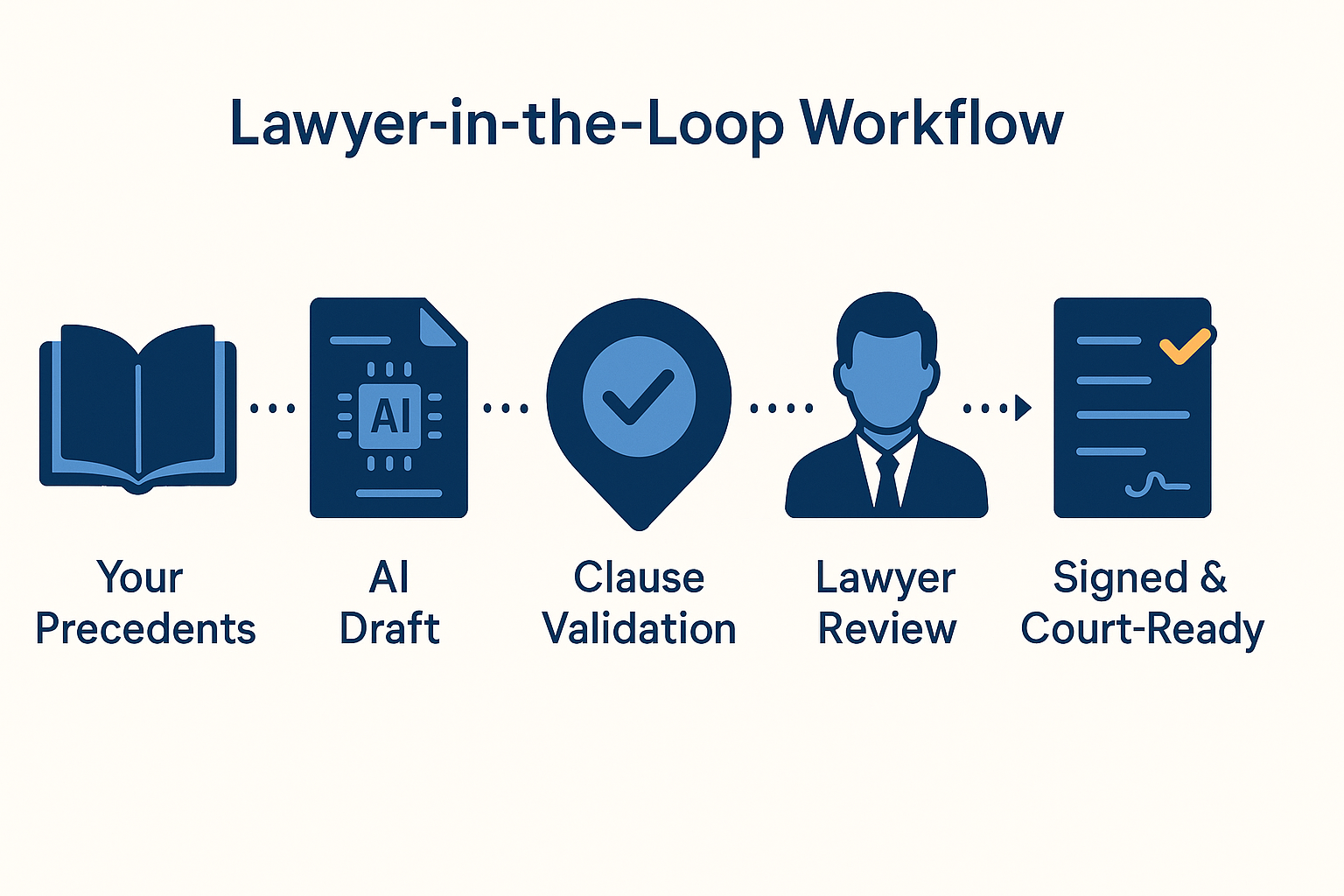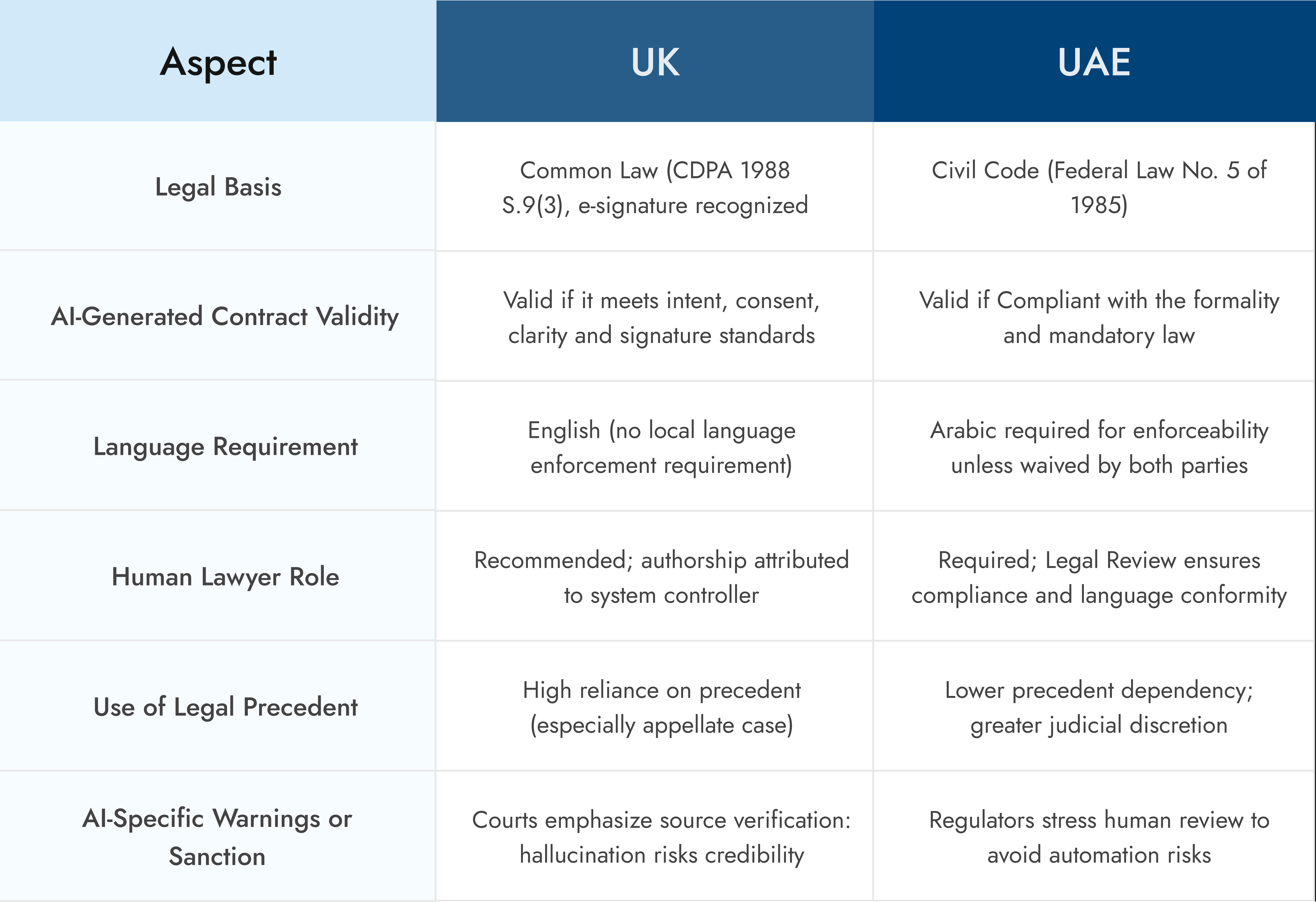
Is AI-Generated Legal Content Enforceable in Court?
Can an AI-generated contract be enforced? Qanooni was built to keep the human lawyer—and their IP—at the center. It accelerates drafting without replacing your expertise. Lawyers using Qanooni save 8–10 hours per week, increasing caseloads by up to 2.2×.
Are AI-Generated Contracts Enforceable?
Yes—when reviewed by a qualified lawyer and compliant with legal fundamentals like intent, capacity, and local law. AI can assist with drafting, but enforceability still depends on the substance, not the software.
What Does "Enforceable" Actually Mean?
For a legal document to be enforceable, it must demonstrate clear intent, capacity, legality, and mutual agreement. The issue with AI-generated content isn't whether it can be signed—it's whether it can be trusted to reflect the parties' intentions and hold up under scrutiny.
How UK Courts View AI-Generated Contracts
There is currently no UK law explicitly invalidating AI-generated contracts. Instead, enforceability hinges on contract fundamentals: clarity, consent, and authorship.
UK law already accounts for "computer-generated works" under the Copyright, Designs and Patents Act 1988 (s.9(3)), where authorship is assigned to the person responsible for the AI system. This reinforces Qanooni's model: the human lawyer remains the responsible author.
Law firms are increasingly deploying AI as a drafting accelerator. As noted in Law360's recent coverage, firms are experimenting with generative tools—but responsibility, review, and precedent still matter.
How UAE Courts Approach AI and Legal Drafting
Under the UAE Civil Code, enforceability depends on adherence to formal and substantive requirements: legal capacity, mutual agreement, and compliance with mandatory law.
There is no prohibition against using AI to generate a draft—but human review remains essential. A clause that violates local public policy or omits required Arabic language equivalents may render the agreement unenforceable.
Are AI-Drafted Contracts Legally Valid?
Yes—but only when the content meets jurisdictional standards and is approved by a qualified lawyer. In both the UK and UAE, courts are not rejecting AI involvement; they're rejecting ambiguity and unchecked automation.
A Word of Caution: Hallucinated Precedents and Legal Misinformation
In early 2023, a New York lawyer was sanctioned for filing a court brief that cited fictitious cases—generated by ChatGPT. The U.S. District Court in Mata v. Avianca, Inc., 678 F. Supp. 3d 443 (S.D.N.Y. 2023) explicitly warned against submitting AI-generated content without human review.
In the UK, the Solicitors Regulation Authority (SRA) approved the country's first AI-enabled law firm in 2025, while simultaneously emphasizing the importance of lawyer oversight. The SRA's authorisation of Garfield.Law Ltd. included guidance on avoiding unverified AI hallucinations.
Similarly, the High Court of England and Wales issued public guidance urging lawyers to stop using generic AI tools for case law research, after instances of fabricated citations emerged. (The Guardian, 2025)
Bottom line: If you're using AI to accelerate legal work, you must retain human oversight. That's why Qanooni is built for lawyer-in-the-loop drafting, clause validation, and jurisdiction-aware outputs.
Why Qanooni Is Different
- Precedent-Based Drafting: Qanooni works from your firm's actual past agreements—not generic templates or scraped language.
- Clause Validation: It guides lawyers to ensure inclusion of required language based on governing law.
- Stateless & Private: Your IP isn't used to train models—your work stays yours.
- Always Lawyer-Led: You review and approve every clause. Qanooni is an accelerant, not a replacement.
Visual Comparison: UK vs UAE on AI-Generated Contracts

This table compares enforceability standards for AI-generated contracts in the UK and UAE, covering legal basis, language requirements, human lawyer involvement, and known risks from misuse of AI-generated content.
Summary: Yes, If Lawyers Stay in Control
AI-generated contracts are enforceable—but only when they are legally sound, jurisdiction-aware, and reviewed by a lawyer. Qanooni was built to put you in control. You bring the judgment. We bring the acceleration.
If you're new to Legal AI, start with our explainer: The Legal AI Revolution.
Want to see Qanooni in action? Read how you can draft your first contract in minutes using your own templates or precedents.
Book a Personalised Demo
See how Qanooni helps lawyers save 8–10 hours per week and manage 2.2× more cases—without compromising legal control.